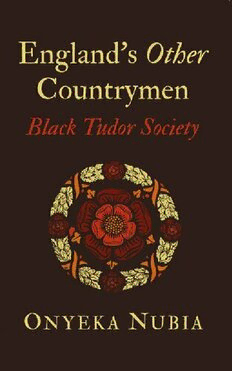
England’s Other Countrymen: Black Tudor Society PDF
Preview England’s Other Countrymen: Black Tudor Society
ENGLAND’S OTHER COUNTRYMEN ZED Zed is a platform for marginalised voices across the globe. It is the world’s largest publishing collective and a world leading example of alternative, non-hierarchical business practice. It has no CEO, no MD and no bosses and is owned and managed by its workers who are all on equal pay. It makes its content available in as many languages as possible. It publishes content critical of oppressive power structures and regimes. It publishes content that changes its readers’ thinking. It publishes content that other publishers won’t and that the establishment finds threatening. It has been subject to repeated acts of censorship by states and corporations. It fights all forms of censorship. It is financially and ideologically independent of any party, corporation, state or individual. Its books are shared all over the world. www.zedbooks.net @ZedBooks ENGLAND’S OTHER COUNTRYMEN Black Tudor Society ONYEKA NUBIA England’s Other Countrymen: Black Tudor Society was first published in 2019 by Zed Books Ltd, The Foundry, 17 Oval Way, London SE11 5RR, UK. www.zedbooks.net Copyright © Onyeka Nubia 2019 The rights of Onyeka Nubia to be identified as the author of this work have been asserted by him in accordance with the Copyright, Designs and Patents Act, 1988. Typeset in Bulmer by Swales and Willis Ltd, Exeter, Devon Index by John Barker Cover design by David A. Gee All rights reserved. No part of this publication may be reproduced, stored in a retrieval system or transmitted in any form or by any means, electronic, mechanical, photocopying or otherwise, without the prior permission of Zed Books Ltd. A catalogue record for this book is available from the British Library ISBN 978-1-78699-420-2 hb ISBN 978-1-78699-421-9 pb ISBN 978-1-78699-422-6 epdf ISBN 978-1-78699-423-3 epub ISBN 978-1-78699-424-0 mobi Contents about the author vi preface vii note on the text x Introduction 1 one Imagining Tudor England 9 two ‘little England’ 30 three The Pathology of the Curse of Ham 55 four Painting the Blackamoore Black 93 five B lack Strangers and Slaves Turn’d African Neighbours 131 Conclusion 165 appendix 1 178 appendix 2 190 notes 194 selected bibliography 283 index 345 About the Author Onyeka Nubia is a pioneering and internationally renowned histo- rian, writer and presenter committed to the study of comparative histories and intersectionalism. Nubia has been a keynote pre- senter at numerous venues including the Houses of Parliament and the National Portrait Gallery, and has been a consultant and presenter for television programmes including BBC Two’s History Cold Case and Channel 4’s London’s Lost Graveyard. He is the writer of Blackamoores: Africans in Tudor England (2013) and Young Othello (2015). Preface ‘We know what we are …’1 ’cause we know, what we were? Books are a writer’s children – but they need to be read to grow into adults. ‘Ay, there’s the rub,’2 because apathy and entrenched political positioning can affect whether and what we read. There is legitimate unease that indifference may be buoyed by the hue and cry of the chat room, and that the one that shouts the loudest and last may blind the eye of reason and drum out the senses. Bloggers have become the new prophets, and social media the new Gods: jealous Gods – that demand obsessive obeisance. Writing a book means taking a stance against the immediacy of the punch line delivered with a shout: tell your audience what they want to hear, how they want to hear it! Authors ask readers to contemplate complicated answers to difficult questions. As a writer, one’s own integrity cannot be compromised by conforming to normatives, simply because they are popular. That would be the equivalent to Nicolaus Copernicus advocat- ing geocentrism3 because the church and his friends told him to. In modern times, historical normatives are often underpinned by concepts of modernism. This is an idea that ‘things’ are getting better. Ancillary to this is a conceit that the past is some- what strange, and the source for most of our ills such as racism and xenophobia. We are told that somewhere, at sometime in viii preface history, racist attitudes began, and that is why people have them now. In other words, our prejudices are a legacy of history. Early modern England: the Tudor and early Stuart periods are blamed for being the incubators of modern racism. It is a truism, that European and European-American thinkers from the eight- eenth to the twentieth century such as: Arthur de Gobineau, Madison Grant, Karl Richard Lepsius, Samuel George Morton and Charles Gabriel Seligman used anthropology, eugenics, history and theology to validate their claims that Africans were inferior.4 These writers imagined history. The early modern period was central in that imagination, because it contained the Renaissance: a ‘look back’ to Europe’s classical antiquity. This flourished between the fourteenth and seventeenth cen- turies and resulted in a ‘rebirth’ of European creativity. Many European and European-American commentators claimed this metempsychosis or reincarnation was an exclusive European soiree.5 This book challenges that notion: Africans helped shape European social ethnology and societies. In claiming this, the social history of Africans that lived in Tudor and early Stuart England is revealed. Indeed, this research has been the focus of a twenty-five year sojourn. By contesting the automatic othering of Africans in the early modern period, a stand is made against long-held narratives on early modern societies contained in post-colonial theories. These conventions have created a mis-memory that Africans had no place in history as protagonists. And that during the early mod- ern period African enslavement defined their impotence and objectification, and is the only major reference point required for any historical investigation. The inference is that the systematic enslavement of African people practised during Georgian and Victorian times can be back-dated to the early modern period, and that there is an unbroken line of English domination of these activities that started with John Hawkins in 1567 and ended in
